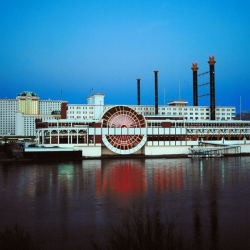Kentucky State Rep. Jerry Miller (R-Louisville) has introduced a constitutional amendment which would legalize brick-and-mortar casinos. The proposed amendment is one of several solutions to the large budget deficit in Gov. Matt Bevin’s proposed 2018-20 state budget.
Miller filed House Bill 229 last week. The bill would legalize land casinos, with 100% of casino tax revenues for the first 20 years dedicated to the pension fund.
Despite the ambition of Jerry Miller’s proposal, even its proponents admit HB229 is a long shot.
The need to find revenues for the pension fund is the main hope for any legalization effort. Still, Gov. Matt Bevin calls gambling a “sucker’s bet” for the taxpayers.
Kentucky’s Pension Crisis
The State of Kentucky has a pension crisis which is growing each year. As a conservative southern state, Kentucky traditionally opposes gambling expansion. Governor Matt Bevin has said on several occasions he does not want to expand gambling.
With the pension crisis looming, some in Matt Bevin’s party appear willing to consider land-based casino gambling as a potential revenue generator. Other states have passed casino expansion to generate tax revenues that do not fall directly on taxpayers, with Pennsylvania as the latest state to do so.
Jerry Miller’s Casino Bill
Rep. Jerry Miller gave his reasons for the amendment proposal, saying, “It’s going to be hard and it’s going to take people contacting their legislators and saying ‘I want to vote on this because I think Kentucky needs more revenue. It’s much more palatable than a tax increase.”
“This would free up tax dollars now going to pensions to be spent on other things in the budget.”
The casino issue appears to have a minimum level of bipartisan support. State Senator Morgan McGarvey (D-Louisville) agreed with Miller’s bill, saying, “The reason this idea has been on the radar for years is that we know we’ve been headed towards very bleak budgets. Well, we’re there now. The budget we’re looking at this year is dire and that has greatly increased the appetite for revenue options.”
Louisville Casino Support
McGarvey’s location in Louisville is motivation for his support. Churchill Downs would like to build a Louisville casino. The site of America’s most famous horse race, the Kentucky Derby, long opposed gambling expansion in Kentucky. If Churchill Downs now wants its own casino, it indicates that Kentucky’s horse racing industry might no long be an obstacle to casino legalization.
In fact, Churchill Downs might become a powerful lobbyist in favor of Jerry Miller’s bill. If the horsetrack’s allies in Kentucky’s horse racing industry follow its lead, then casino legalization might have better odds of success than one might think.
Tom Troth’s Opinion
Most experts see those chances as slim. Last year, when others advocated casino gambling as a solution to the pension fund crisis, a number of Kentucky lawmakers laughed at the proposition of Kentucky casinos.
Social conservatives in the state are hardly laughing. Tom Troth, the Kentucky Baptist Convention’s main lobbyist, said of House Bill 229, “I don’t think its chances are any better this year. I expect most legislators still agree that this is a terrible way to implement public policy and a favor to multi-national gambling interests….There are other revenue alternatives without the social costs.”
House Bill 229’s Path to Passage
House Bill 229 has a high bar. A constitutional amendment requires passage by a margin of 60 of 100 House members and 23 of 38 senators. That means a significant number of the Republican majority would need to vote for passage.
A constitutional amendment has one major advantage: Matt Bevin would not have to sign the bill. Kentucky’s governor cannot veto a bill which gains the 60% approval in the state legislature. Instead, it would go on the 2018 midterm ballot as a casino referendum. If the state’s voters approved the measure, legal casino gambling would become Kentucky law.

